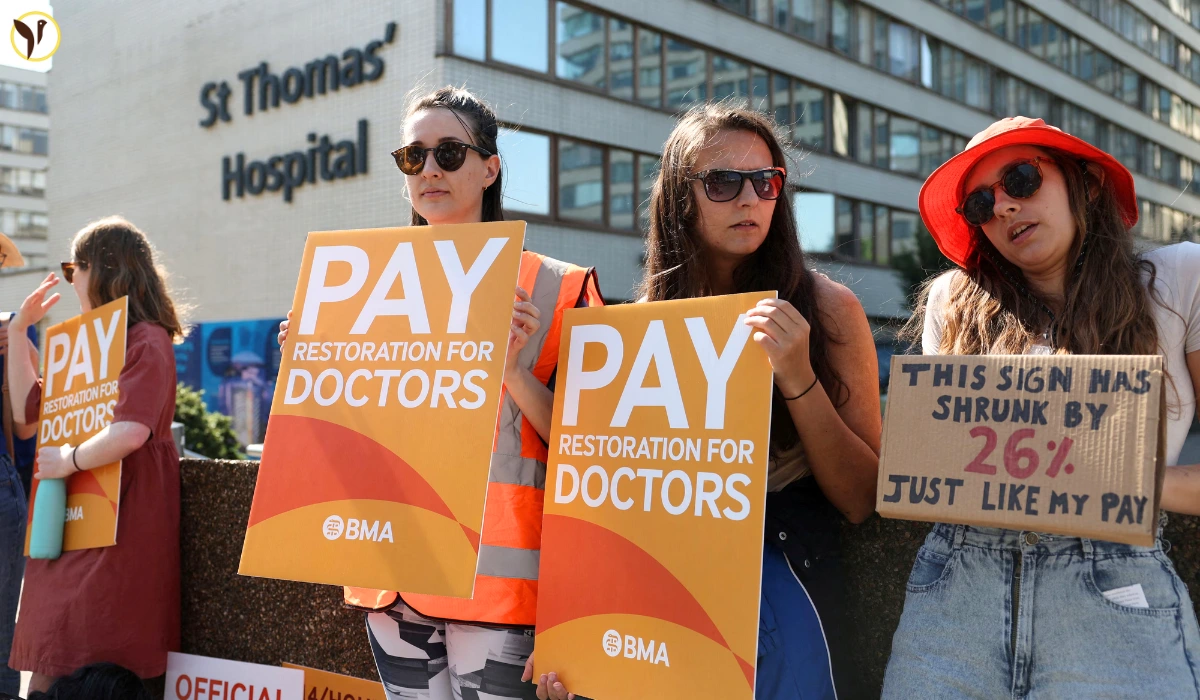England’s junior doctors—sometimes called resident doctors—are set to be on strike from July 25 to July 30, 2025. They want a 29% pay rise. That demand comes because their pay has fallen behind over the years. This strike could delay thousands of appointments and operations just when the NHS is trying to get services back on track.
There’s real worry now. Doctors hope the government hears them. Let’s look at what’s happening, what we might not know yet, and how this affects us all.
Why the Strike Is Happening Now
The British Medical Association (BMA) asked its junior doctor members to vote on striking. About 55% voted, and 90% of those who voted said yes. That’s a strong sign of feeling in the profession—many are clearly frustrated.
The doctors say the government already gave them 22% over two years, plus a 5.4% rise this year. But that’s still not enough to make up for years of pay being hit by inflation. They say they need 29% total to restore their earnings to where they were in 2008. That’s why they’re back on the picket lines.
The Government’s Answer and Public Feeling
Health Secretary Wes Streeting says the pay rise demand is “completely unreasonable.” He argues the NHS can’t afford more money, and that doctors have already had the biggest public sector pay rise in recent years. He also warns this strike could “derail the NHS recovery.”
Public support for the strike seems low now—some polls show only 21% support junior doctors striking this time, down from around half last year. That matters, because the government may feel less pressure if people aren’t backing the doctors.
What’s New That Others Haven’t Covered Yet
-
Mandate strength vs. actual turnout
It’s important that the 90% “yes” vote came from only 55% turnout—so about 30% of all junior doctors actively support the strike. That’s strong, but not total. Still, the BMA has the legal right for six months of action until January 2026. -
Real-term pay drop vs. inflation math
Doctors compare their pay loss using RPI inflation, which is higher than CPI. If CPI was used, their total raise demand would be far lower. This explains why both sides have very different numbers. -
Ripple effects in the system
If junior doctors strike, nurse and consultant unions might also get ideas to push for more pay. That could lead to bigger NHS disruption down the road. -
Geography of impact
Rural and underfunded hospitals may feel this harder. If their staff walk out, those places may lose even more services, worsening health access. -
Recruitment at risk long-term
Many young medics now worry about NHS careers. If this dispute drags on, it could make fewer doctors want to join or stay in the NHS.
How It Affects You as a Patient
-
Routine check-ups and operations may be canceled.
-
Life-saving emergencies will still go ahead—but delays could happen.
-
Waiting times for non-urgent care could increase.
-
You may need to plan ahead by asking your GP or hospital about delays.
What Junior Doctors Are Saying
The BMA resident doctors’ co-chairs, Dr Melissa Ryan and Dr Ross Nieuwoudt, said they don’t want this strike, but feel pushed. They told Health Secretary Streeting to talk or else disruption is unavoidable.
A public statement from Streeting warns the public would “not forgive” the strike. That’s a tense tone from him. Both sides sound serious and anxious right now.
Public Reaction on X
From the BMA’s official X account:
“Resident doctors in England have voted YES to resuming strike action over pay.”
Don't negotiate?
— Emma Runswick 🏳️🌈 (@ERunswickBMA) July 8, 2025
Get strikes
✊🏼✊🏿✊🏽
🔸️🔹️🔸️🔹️🔸️🔹️🔸️🔹️🔸️#DoctorsStrike #WinTogether https://t.co/YiIKtrzpAd
And Health Secretary Streeting:
“Decisions I have taken mean that Resident Doctors have had a 28.9% pay increase covering the last three years. These are not grounds for strike.”
Decisions I have taken mean that Resident Doctors have had a 28.9% pay increase covering the last three years.
— Wes Streeting (@wesstreeting) July 8, 2025
These are not grounds for strike action.
And most BMA resident doctors didn’t vote to strike.
I will be meeting the BMA today.
Why It Matters to Everyone
-
For doctors: This is about fairness and being able to afford life after long study and work.
-
For patients: Waiting lists may grow again; getting an appointment could take longer.
-
For the NHS: The system needs to hire and keep good staff and not lose them to other countries.
-
For the government: It’s a test of how much NHS & health budgets can stretch.
The strike feels like part of a bigger crisis. Doctors want to feel valued, and the NHS needs strong staff to fix healthcare for good.
What Happens Next
-
Negotiations window: Doctors have two weeks before July 25 to force the government back to talks.
-
Strike starts: July 25 to July 30.
-
After that: If no deal, the BMA has a mandate through January, so more strikes could come.
-
Public and political pressure: Will people support the doctors? Will the government move?
Quick Bullets to Know
-
Strike dates: July 25–30.
-
Demand: 29% pay increase.
-
Doctors already got 22% + 5.4%.
-
Possible impact: Cancelled ops, longer waits.
-
Votes: 90% yes, 55% turnout.
-
Wider risk: Could inspire other staff to strike.
-
Public support: Dropped to about 21%.
-
Next steps: Talks in 2 weeks or strike begins.
Image Source: Reuters









